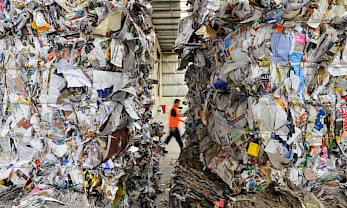Australia at risk of losing billions of dollars in revenue without recycling
 Australia could see billions of dollars in revenue lost without a profound cultural shift to a circular and zero-waste economy that re-uses plastic, glass and paper instead of burying it in landfill or exporting it.
Australia could see billions of dollars in revenue lost without a profound cultural shift to a circular and zero-waste economy that re-uses plastic, glass and paper instead of burying it in landfill or exporting it.
The national science agency, CSIRO, released a detailed circular economy roadmap identifying major challenges including inconsistencies across states, a lack of reprocessing capacity and the continued loss of materials to landfill and dumping.
“These challenges can only be overcome with a concerted effort to build a national culture that values the re-use of secondary materials,” the roadmap says.
The roadmap will be key to unlocking billions of dollars in lost value and supporting the country’s impending export bans on waste glass, paper, plastics and tyres.
Dr Heinz Schandl, a senior CSIRO scientist who led the roadmap’s development, told Guardian Australia that industries supplying products and materials needed to develop a “deeper responsibility for their product” and that this would bring a fundamental shift.
Australia only recycles about 4% of plastics, 33% of glass and 36% of paper, the roadmap says, and in 2019 exported 1.4mt of those materials as “waste”.
Significant volumes of glass, paper and plastics also end up in landfill either because recycling loads are contaminated and can’t be sorted, or the products are designed in a way that doesn’t allow materials to be easily separated.
Only 14% of tyres are recycled or re-used, with 55% of used tyres being exported and 31% going to landfill.
Previous research highlighted in the roadmap says an increase in 5% of Australia’s recycling rate would add an estimated $1bn to the country’s GDP.
A lack of collection and processing infrastructure to deal with lithium batteries – used in a range of products from mobile phones and laptops to electric vehicles – could see $2.5bn of economic opportunity lost annually by 2036.
The roadmap was developed after reviewing current and emerging technologies and consulting more than 80 stakeholders across business, government and academia.
Schandl said there was growing recognition that the issue was far broader and more complex than simply improving recycling figures.
He said: “The big thing you could change is by extending producer responsibility where the manufacturer has an extended responsibility for the primary materials used in a product.”
Schandl said that capturing and using recycled materials tended to require lower levels of energy, therefore reducing greenhouse gas emissions.
The Morrison government’s ban on exporting waste glass came into force on 1 January, with bans on waste plastic, paper and tyres to be phased in from July 2021 to July 2024.
To avoid the plastic export ban resulting in extra landfill, the roadmap says the country’s processing capacity will have to go up by 150%.
But an estimated $419m of value was being lost each year from two commonly used plastics because they were not being recovered after they were used.
The roadmap says there will need to be major improvements to the retention of resources that are contained in products, more innovation in recycling facilities and better product designs. New markets will need to be developed and consistent standards introduced across the states.
“A transition to a circular economy will require profound changes to industrial, institutional, economic, social and consumption practices,” the roadmap says.
“None of these things will be possible without a national culture that thinks ‘re-use’ before ‘throw out’ and acts accordingly. Every channel should be used to support that vision, to change mindsets and guide behaviours both at home and at work,” the report adds.
In July last year the government announced a new $190m fund to modernise Australia’s recycling industry which it said would attract $600m of investment.
Recycling was also included, alongside clean energy, as part of a $1.3bn fund to modernise manufacturing.
Environment minister Sussan Ley has described the export bans and investments as a “once in a generation opportunity to improve waste management and recycling”.
Last week Ley joined Victoria’s energy, environment and climate change minister, Lily D’Ambrosio to announce a joint $46m initiative to support seven glass and plastics projects.
The federal government said in a statement at the time that the funding would increase the state’s plastic recycling by 40% and create 350 jobs.
You can return to the main Market News page, or press the Back button on your browser.

